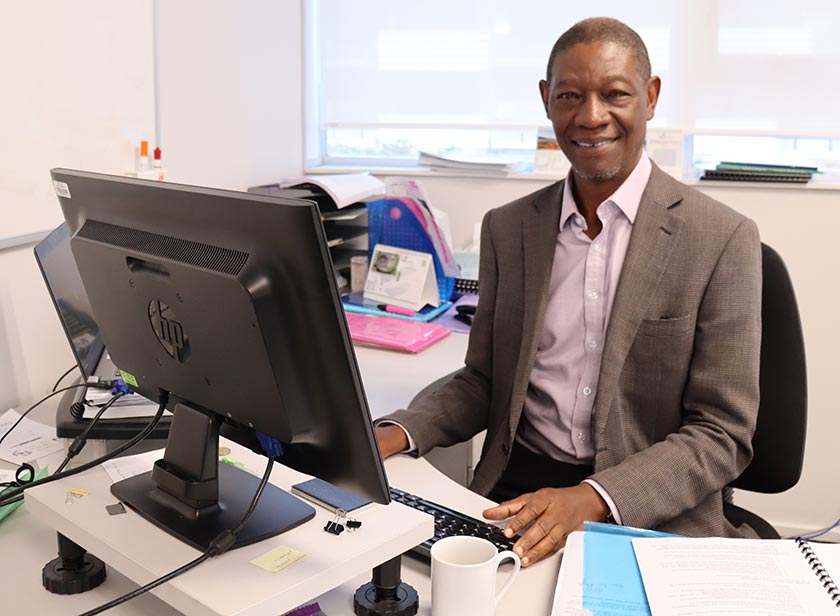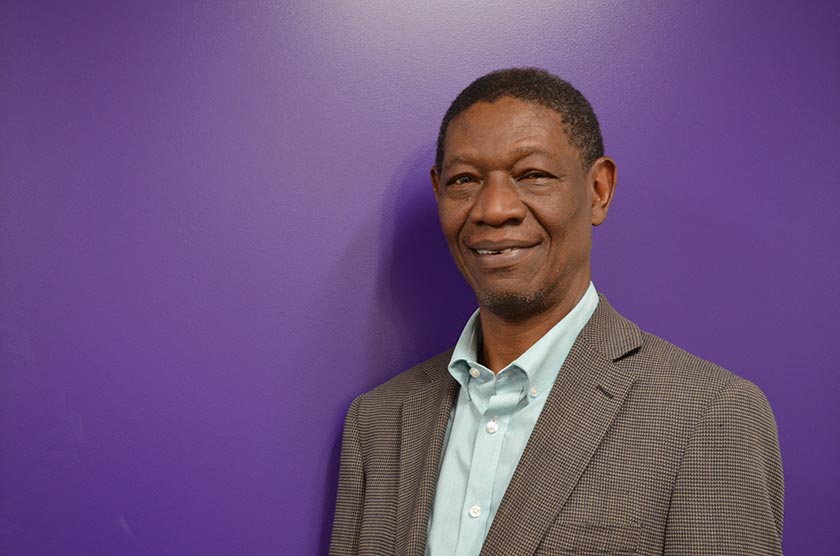
It’s time for someone else to do the juggling!” That’s NZNO chief executive (CE) Memo Musa’s sentiment as he steps down after eight years.
He says many people underestimate the complexity of NZNO – “the internal and external relationships, which bring different tensions and conflicts, both in interests and agendas”.
Then there’s the sheer scope of the work – industrial, professional, legal, policy, research, regulation and education. And that’s not to mention an abiding commitment to equity and social justice. “It takes enormous time and effort to deal with interests of our diverse membership, the sometimes conflicting situations and demands, as well as the ongoing operational requirements,” he explained. On top of that has been “the increasing and unnecessary abuse” on social media.
“Leading NZNO has become a real juggling act and it is time for someone else to do the juggling.”
Despite the pressures and the governance turbulence of the last three years, Musa believes NZNO has continued to “move forward, punch above its weight on key issues and is listened to, taken seriously and respected”.
‘A nightmare to navigate’
He says the last three years of “unprecedented events and turbulence in our governance” has been a “nightmare to navigate” and undoubtedly the most difficult time of his tenure. That turbulence has included board complaint investigations, two special general meetings in 2019, the resignations of the vice-president, president and three board members in the first half of 2020 and the resignation of the next elected president late last year. And he had to decide whether to accept two member petitions arising from the turbulence – he rejected both.
All these issues took a lot of time and energy “which I would have preferred to put to more effective use elsewhere”.
Despite this “negative energy”, he was determined to navigate the turbulent waters. “As a leader, if you know what is right, you do the right thing, stay true to yourself and others, maintain your integrity and your moral, ethical and professional compass. Doing that gave me the resilience to work through those turbulent times. Bailing out was not an option, as during that time, NZNO continued to function well operationally. That gave me the perseverance to carry on.”
As he reflects on his time as NZNO CE, Musa keeps returning to the issue of trust. “For the organisation to function effectively, it largely comes down to trust, respectful constructive relationships, team work and understanding the functions of governance and operations.”
He believes the constitutional review – endorsed last year through the one-member one-vote system – will be challenging. “But I hope and believe it will bring greater transparency in governance, decision-making and member participation. And much-needed clarity between governance and operations.”
The lack of trust and respect between NZNO governance and operations is not new. “It has been an ongoing hindrance and unnecessary distraction. I identified that in my first six months. Everyone worked hard to reignite trust and respectful, constructive relationships and to operate from a positive construct, rather than a negative and blaming one.
“You can have the best constitution or rules, the best governance structure founded on the premise of a bicultural partnership, the best guidelines, position statements and policy positions on various issues of importance to members, but these will not work or go far, nor will key parties take heed of them, if they are not, fundamentally, underpinned by trust and respectful relationships.”
‘A blaming culture’
And he sees the situation at NZNO in the context of the wider health sector. “The sector is riddled with a blaming culture. We must collectively work to change this and create a culture of accountability, not blame, and to stop the fear of retribution for those who speak out.”
Despite the time and energy diverted to governance issues over the last few years, Musa is pleased NZNO has remained influential at key union, health, nursing, social justice and policy tables. “NZNO is well respected. Without influence, without trusting constructive relationships, opportunities to advocate on behalf of members and the profession will be lost,” he said.
“We continued to put forward strongly NZNO’s perspectives on key issues in key forums. Even as COVID-19 took hold across the globe and in New Zealand through the lockdown, we were present where it mattered most, in the right forums to put members’ professional and industrial issues forward.”
He’s always remembered the words of the president of the Canadian Federation of Nurses Unions, Linda Silas, at the 2014 NZNO conference: “If you are not at the table, you are on the menu.” He’s also found comfort in similar words from International Council of Nurses’ president Annette Kennedy, who once said: “If you are not invited to the table, take your own chair and join the table.”
NZNO ‘at the table’
“In these tough governance times, the reality is NZNO has remained at the table and, where appropriate, we have taken a chair to the table, if not invited.”
Musa believes NZNO’s leadership and contribution in key areas has helped shape conversations. NZNO has lobbied hard for more health funding, equal pay, pay equity, safe staffing, full employment of new graduate nurses, a funded entry-to-practice programme for enrolled nurses, national nurse practitioner training, climate change and changes to employment and health and safety legislation.
“NZNO will continue to be influential where issues affect members and the profession. There have been some wins. However, due to the amount and complexity of the work, the wins quickly fade, as more issues constantly emerge, requiring our attention. This is due to a stretched and under-funded health system and a nursing workforce which is not growing fast enough to match population growth, an ageing population and increasing complexity in health needs.”
Musa says it’s easy to forget what has been gained and the progress made in chipping away at major issues which have been around for decades. “Not all issues can be solved instantly. We must celebrate and build on our wins, rather than saying they are not enough.”
Musa praises the complex and unrelenting work of industrial and professional staff. “It’s important NZNO’s operational, industrial and professional advocacy is visible. We have committed staff, who go the extra mile for members and the profession as a whole, but sadly they are sometimes attacked on social media for their efforts. I back them to do the mahi and they need members’ support.”

Looking back, Musa has few regrets. “With the benefit of hindsight, there are some situations and things I would approach differently. As I reflect, I see NZNO’s significant participation on key member matters. In our work with the Council of Trade Unions, the Nursing Council, nurse leaders, the Ministry of Health and other agencies, our relationships continue to strengthen and our input is sought. While we may not always agree, we put our viewpoint uncompromisingly on behalf of members.”
“I was unable to moderate some of the abusive language on social media…”
But he does have one abiding regret. “I was unable to moderate some of the abusive language on social media, about the work of NZNO, its staff and governance. Some of it was directed at me personally. What I find sad is the potential damage this does to those subjected to it, and to the profession. I struggle to reconcile how someone can hide behind the keyboard and use vitriol towards their professional colleagues. I’m not sure how that contributes to constructive relationships and advancing nursing. I have learnt not to take things personally and I draw invaluable support from my network of colleagues, professional/management mentors, friends, family and my cultural background.”
Cultural support
Musa hails from Zimbabwe. Part of his cultural support is a series of questions he received from elders in Zimbabwe and which he asks himself regularly: Have you been true and honest to yourself? Have you been true and honest to others? Have you done something today which has intentionally or unintentionally hurt someone or something? and Are your key relationships intact?
“My folk and mentors across the globe say that if the answer to most of these questions is ‘yes’, then rest and sleep with ease. However, this does not diminish the impact of the abuse or make it right.”
He is looking forward to a renewed focus on mental health and addictions in his next role as CE of Platform/Atamira Trust. He hopes to return to nursing practice and education, pending agreement with the trust. “I want to get close to the reality of the policy, funding and health-system issues faced by non-governmental organisations in the mental health and addiction sectors.”
Outside work, Musa’s primary passion is football – he was in New Zealand’s bronze-medal winning team at the World Masters Games in 2017 – and referees at top level. He also loves walking, biking – “on proper bikes, not electric ones” – cooking, reading and is a seasoned gardener. “I love gardening. We are self sufficient in most vegetables throughout the year. The best thing about gardening is that you do all the preparatory work, watch the plants grow and then harvest them. Plants do not answer back or abuse you – that’s very soothing.”
‘Onwards and upwards’
As he hands over the juggling balls, Musa thanks NZNO’s “highly spirited and committed” staff, the members he’s worked with and current and former board members. “Despite the difficulties, there is only one way for NZNO – onwards and upwards. It’s in good stead and can build further strength to achieve more wins for members.”


